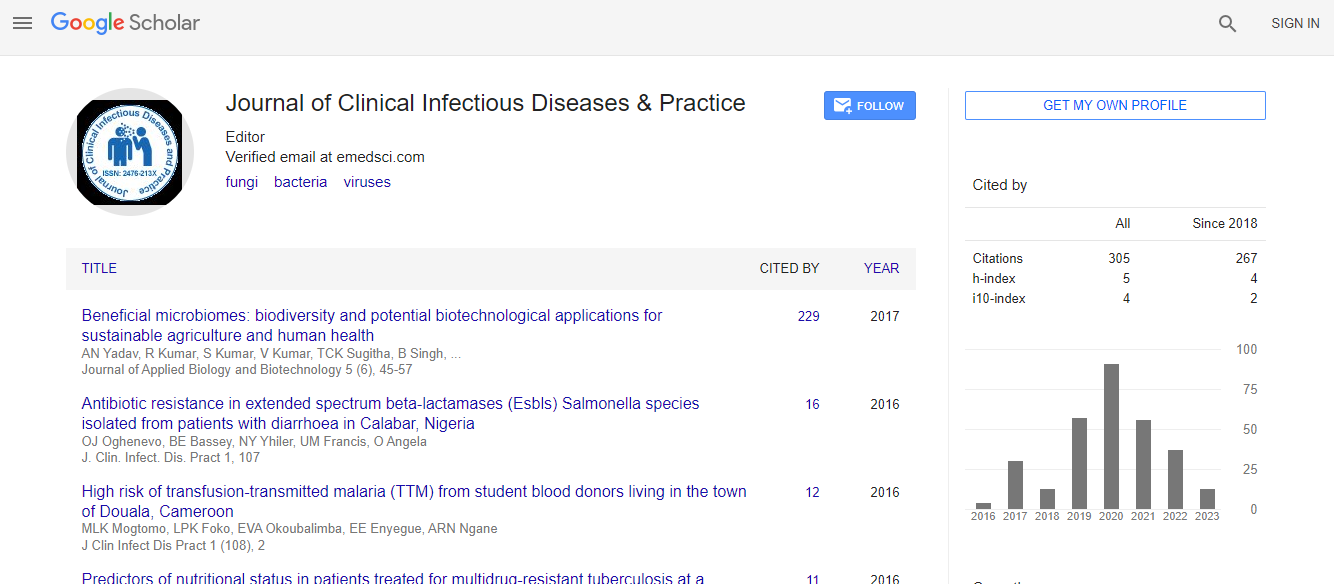Our Group organises 3000+ Global Conferenceseries Events every year across USA, Europe & Asia with support from 1000 more scientific Societies and Publishes 700+ Open Access Journals which contains over 50000 eminent personalities, reputed scientists as editorial board members.
Open Access Journals gaining more Readers and Citations
700 Journals and 15,000,000 Readers Each Journal is getting 25,000+ Readers
Google Scholar citation report
Citations : 531
Journal of Clinical Infectious Diseases & Practice peer review process verified at publons
Indexed In
- Google Scholar
- RefSeek
- Hamdard University
- EBSCO A-Z
- Publons
- ICMJE
Useful Links
Share This Page
Non-dystrophic myotonic disorders: Patients’ insights on treatment access
9th World Congress on Rare Diseases and Orphan Drugs
Carina Schulmann Schey, Foerster D, Whiting A, Kole A, von Gallwitz P and Meier Y
University of Groningen, The NetherlandsLupin Atlantis Holdings, Switzerlandadmedicum® Business for Patients GmbH & Co KG, Germany
Posters & Accepted Abstracts: J Clin Infect Dis Pract
Abstract
Background: Non-dystrophic myotonic (NDM) disorders are a heterogenous group of rare, genetic skeletal muscle chloride and sodium channelopathies with altered membrane excitability resulting in prolonged muscle contraction and delayed relaxation. Patients experience stiffness, pain, weakness, impaired mobility, fatigue, disability, falls, problems with speech, chewing and swallowing. Patients with NDM experience unpredictable frequency and severity of myotonic episodes, associated with life-long symptoms and negative impact on physical functioning and quality of life. Treatment has included unlicensed products such as mexiletine. This study sought to evaluate the awareness and access to mexiletine across Europe, and subsequent harm caused by limited treatment access. Following the study, mexiletine gained European marketing authorisation.Method: A two-stage study ascertaining the level of access to mexiletine and benefits for those treated with mexiletine was developed and conducted in required languages. Healthcare experts and patient representatives were interviewed, followed by an online survey for patients and caregivers, in 13 countries.
Results: Online questionnaires were completed by 37 NDM patients, of whom 41% were currently taking mexiletine. Of those not taking mexiletine, 67% had never heard of mexiletine and 25% reported it not being available in their country. Treatment was required by 67% of patients to allow muscle warming before physical exertion and 50% to improve emotional well-being, and mexiletine drastically reduced frequency of falling in 44% of patients. Anxiety about future access to mexiletine affected 87% of patients. Disruption in mexiletine treatment harmed 85% of patients.
Conclusion: Mexiletine-treated patients experienced substantial benefits, while denied access resulted in substantial harm.
Biography
Carina Schulmann Schey is pursuing her PhD in the economics of orphan drugs and assessing alternative ways to adjudicate their value-add in the management of rare diseases. With a background as a Clinical Pharmacist with a special interest in rare diseases, she has published several peer-reviewed articles and abstracts in rare diseases. She sits on the expert judges’ panel for the MassChallenge and on the scientific advisory panels for several charities, and as a Non- Executive Director for healthcare organizations.
E-mail: c.f.schey@rug.nl

 Spanish
Spanish  Chinese
Chinese  Russian
Russian  German
German  French
French  Japanese
Japanese  Portuguese
Portuguese  Hindi
Hindi 
